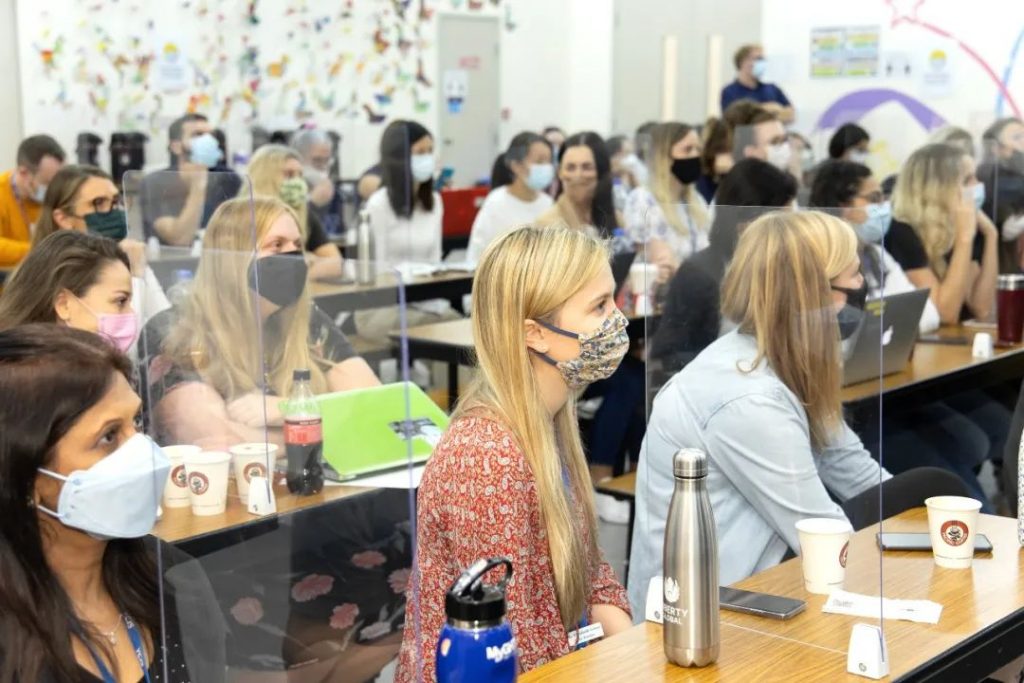1200+ YCYW Educators Meet for E-learning Development

To highlight and promote good practices in teaching, Yew Chung and Yew Wah held an "E-Learning Professional Development Days" event on November 27-28, 2020. Speaking at the opening, CEO and School Supervisor Dr Betty Chan Po-king, described the changes sweeping education the world over as “unprecedented". “It is up to us to adapt our educational practices to ensure that our students can learn successfully using 21st century tools at our disposal,” she said.

Dr Betty Chan Po-king
Over 1,200 Chinese and Western teachers and principals from 12 schools (YCIS and YWIES) joined the sessions organised by the Curriculum and Professional Development Division (CPDD). There were three keynote speakers who set the tone and a further 98 elective workshops designed by our educators to break down the issues.

Dr Bob Horton, the education director of YCYW, serves as MC of the first day

Dr Lam Tung-fei serves as MC of the second day
On the first day – focusing on online and blended teaching – participants exchanged experiences of their journeys that changed course in unprecedented ways from January on.
We invited two keynote speakers, Professor Nicki Hedge, Professor of Educational Theory and Research at the University of Glasgow, and Professor Nancy Law, Deputy Director, Centre for Information Technology in Education (CITE), Faculty of Education, The University of Hong Kong.


Professor Nicki Hedge
Drawing upon her experience in England, Professor Hedge underlined the importance of “trust”. She rated this on par with technology adoption.
Image
In these uncertain times, she said, it was important that educators placed trust in themselves and their colleagues. At the same time, they needed to understand and respond to learner vulnerabilities. Striking an optimistic note, Professor Hedge suggested that the investment in trust and sharing today would enable the development of enhanced pedagogical approaches in the pursuit of deeper learning and smarter teaching for the future.

Professor Nancy Law

Professor Law used research data to provide insight into blended teaching that has become the “new normal”. She shared the findings of her recently published research project – “eCitizen Education 360” – on the impact of school suspension on students, teachers and schools in Hong Kong.
The study looks at factors that contribute to online learning preparedness when it comes to schools and teachers. She found that the key to the success of e-learning lay beyond institution walls. Family support in fostering a learning environment was that critical ingredient. That support from the home combined with a multidisciplinary approach and intuitive leadership at schools are what underpin the new structure.



The 60 intensive workshops on the first day covered four main themes: tools and class strategies; curriculum planning and development; management view and reflections; well-being and community building.


Teachers introduced and shared their thoughts on useful software, like ClassIn, Zoom, Seesaw, Ding Ding (Ding Talk), Padlet and Teams. Along with this, differentiated learning, flipped education, critical thinking and our unique Learning Communities were thoroughly investigated. Principals talked about the growing and essential cooperation between schools and parents as well as among school departments to coordinate effort to achieve macro objectives.
Yew Chung and Yew Wah place great faith in their teachers’ self-motivation, professionalism and willingness to share. All workshop hosts were either staff recommended by the principals or teachers who volunteered to host.
Chief Education Officer Dr Troy Lui offered a pat on the back for the diligent group leaders. “The hosts of our workshops include experienced Master Teachers and also young teachers. Every teacher can apply for host, regardless of qualification and experience,” he said. His conclusion? The best way to encourage teacher development is through exchange and interaction.

The themes of the workshops on the second day were “Learning Chinese” and “Learning with Chinese”, a subtle but important distinction. The participants included 350 Chinese teachers. The diversity and depth of the workshops showcased the strength of our Chinese curriculum.
Well thought out technical support for the event made all the conversations and exchanges across the globe possible.
As Dr Lam Tung-fei, one of the co-ordinators of the event put it, “The scale and format [of this event] is unprecedented in our organisation.”

“With over a thousand people joining online, we had no big technical problems,” Dr Lui pointed out. “The event ran smoothly. We thank our IT colleagues and the co-ordinators in CPDD.”
Providing a summation and the note to end the occasion, Professor Paul Yip Kwok-wah, Chairman of Hong Kong Yew Wah International Education Foundation, shared his experiences over the past 60 years. He focused on the role of teachers and recalled the inspirational founding of Yew Wah.

Professor Paul Yip Kwok-wah
He encouraged teachers to make reading a lifelong hobby and to nurture Yew Chung and Yew Wah students to enable them to develop into outstanding citizens. Students have to be imbued with a strong humanistic spirit and the ability to think out of the box.
In this new age it is important to master technology without being defined or limited by it, he concluded.